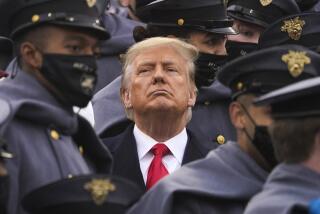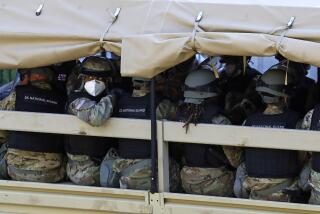Wider Powers for U.S. Forces in Disasters Are Under Review
- Share via
WASHINGTON — A senior White House official said Saturday that in the wake of the hurricane that demolished part of the nation’s Gulf Coast, the Bush administration was studying whether to expand the president’s powers to deploy the U.S. military in natural disasters.
Dan Bartlett, counselor to President Bush, said that the administration was reviewing whether to increase the president’s power to dispatch troops at the outset of a disaster and to give them law enforcement duties.
“There’s agreement that this is something that has to be studied,” Bartlett said in an interview.
The administration’s interest in expanding presidential powers to deploy the military on United States soil stems partly from its frustration over the inability to negotiate an agreement on chain of command with Louisiana’s governor in the first days after Hurricane Katrina struck.
The administration has been widely criticized for what was seen as its failure to send enough troops to Louisiana in the early days to maintain order.
One senior administration official, speaking on condition of anonymity because of the political sensitivity of the issue, said that two days after the storm hit, the White House proposed a single chain of command for troops who would be used to secure New Orleans.
Louisiana Gov. Kathleen Babineaux Blanco rejected that proposal, the official said.
Blanco has said that though she wanted the assistance of federal forces, she did not want to relinquish command of the National Guard to the federal government.
The official said the administration was never able to reach agreement with Blanco, but ultimately was able to establish a de facto single chain of command because Lt. Gen. Russel L. Honore, commander of Joint Task Force Katrina, had a close working relationship with Maj. Gen. Bennett Landreneau, the adjutant general of the Louisiana National Guard.
As the two worked to restore order in New Orleans, “they were attached at the hip,” the administration official said.
“By sheer force of personality and because of the mayor’s and governor’s praise of Gen. Honore, he through practice put into effect a single chain of command,” the administration official said.
Separately, congressional sources said that Sen. John W. Warner, a Virginia Republican and chairman of the Senate Armed Services Committee, conducted a closed-door meeting with administration officials and military leaders Tuesday to discuss what must be changed to avoid repeating the fumbled response to Hurricane Katrina, and he has scheduled a second session for this Tuesday.
The sources said Warner thought some change might be needed in the 19th century law that restricted use of the military on U.S. soil, known as the Posse Comitatus Act, but they emphasized that there were no immediate plans to expand presidential powers to dispatch troops.
In general, Washington can use active-duty federal forces only in support roles, such as search and rescue operations, during disasters in the United States.
The federal government is largely prohibited from using them for law enforcement; the only exception is when there is an insurrection against the government’s authority. The last time the insurrection exception was invoked was during the 1992 Los Angeles riots.
Any expansion of the U.S. military’s role during disasters would represent a considerable change from the emergency response plans drawn up after the Sept. 11, 2001, attacks on New York and the Pentagon.
Those plans are premised on the notion that local police officers, firefighters and ambulance crews are the most effective first responders and that state-controlled National Guards are the next. The armed forces and other federal agencies are assigned largely supporting roles.
But administration and congressional leaders are rethinking the post-9/11 plans after the hurricane’s assault on Louisiana and Mississippi demonstrated what can happen when local law enforcement agencies are overwhelmed.
The storm not only knocked out most public services but caused a widespread breakdown of civil order, particularly in New Orleans, where armed gangs roamed the streets for days, terrorizing survivors, before enough law enforcement officers arrived to reestablish order.
“The would-be first responders at the state and local level were themselves victims in very large numbers,” Defense Secretary Donald H. Rumsfeld said at a recent news conference.
Officials in Washington have been reluctant to comment publicly about the possibility of expanding presidential powers to dispatch troops, at least in part for fear of being seen as using the recent disaster for a power grab.
Bartlett said Bush planned to make a major speech about the hurricane and its aftermath, although he declined to say when.
“You can expect the president to speak to the nation on where we go from here,” he said.
The White House has been scrambling to organize a sweeping relief and recovery effort after taking a pounding in the polls for its initial slow response to the disaster. But Bartlett said he took solace from recent polls that he said showed “people do understand that this was an extraordinary circumstance.”
Bartlett described the storm and its aftermath as “a kind of fact-driven story in the minds of the public.”
“Last Friday when the security situation began to be stabilized,” he said, “we think that was kind of a page-turner.”
More to Read
Sign up for Essential California
The most important California stories and recommendations in your inbox every morning.
You may occasionally receive promotional content from the Los Angeles Times.











